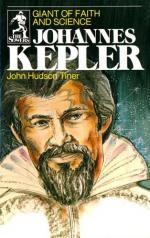|
This section contains 5,520 words (approx. 19 pages at 300 words per page) |

|
SOURCE: Kepler, translated and edited by C. Doris Hellman, Abelard-Schuman, 1959, pp. 376-88.
Below, Caspar argues that religious zeal and a desire to explore the universe as a manifestation of God's plan were the prime motivations for Kepler's scientific ventures.
2. Kepler's View of the World and His Doctrine of Knowledge
Now what, more exactly, was it which invested Kepler with such great rapture and let him hope for such a great moral effect among people? It was, as we have seen throughout this biography, the passionate experience of order which he encountered in the universe, an experience which even in his youth had seized him most vehemently and which influenced him throughout his whole life so that, as his son-in-law Bartsch said after his death, his devotion to the contemplation of heavenly things was almost like a miracle. Forma mundi, the shape of the world, formed the great theme...
|
This section contains 5,520 words (approx. 19 pages at 300 words per page) |

|


